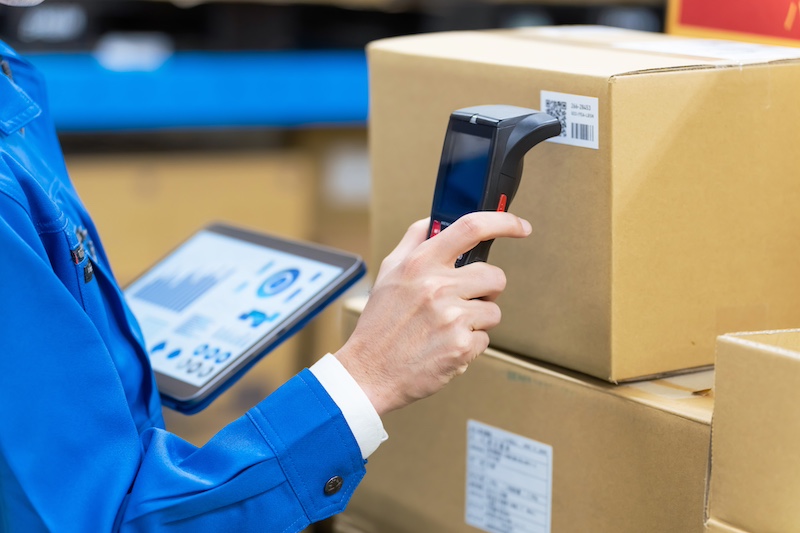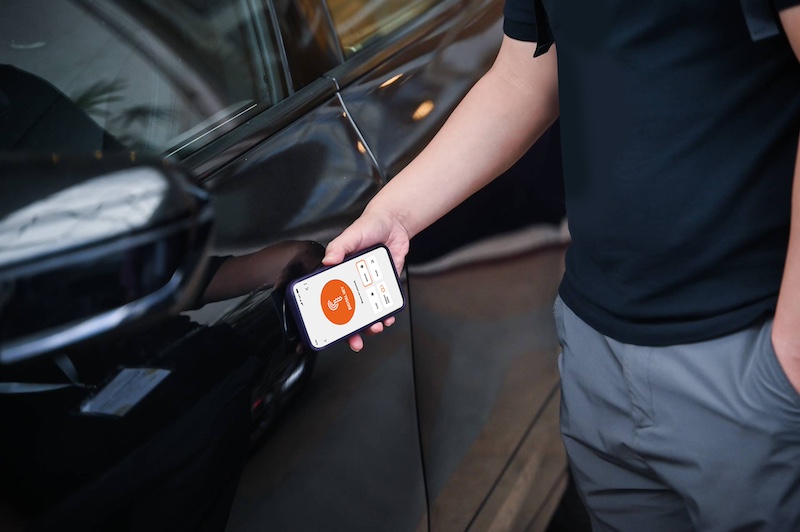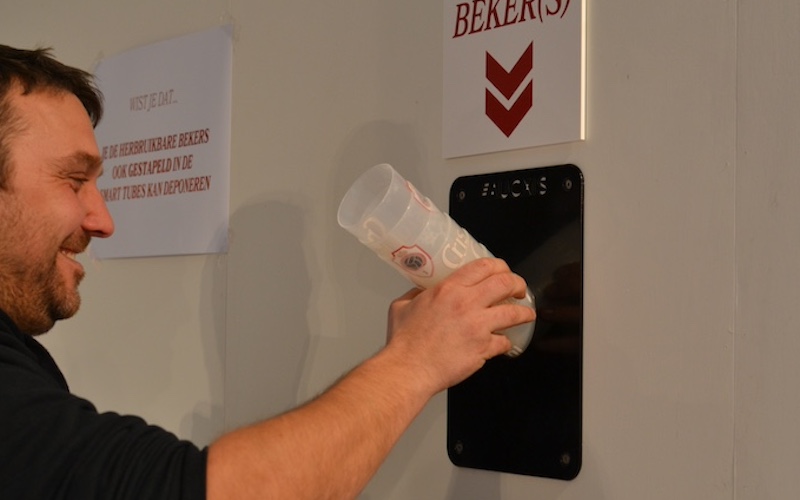RFID Helps Laundry Serve London’s Five Star Hotels
Luxury hotels in London are benefiting from an RFID-based solution from Royal Jersey Laundry that is managing their linens and textiles, including everything from sheets and towels to tea cozies.
Since launching the solution from HID Global in 2019, Royal Jersey Laundry reports that it has improved efficiency, reduced labor and boosted customer satisfaction. So far, 40 percent of the laundry service’s customers have been using the technology at their own sites as well.
Founded in 1915, Royal Jersey Laundry serves luxury hotels in the London area. The 25,000 square-foot facility east of London rebuilt in 2021 after a fire destroyed the original premises. Despite the setbacks of the fire and pandemic, Royal Jersey Laundry operates 24/7, employs 150 staff and processes 550,000 individual pieces per week. That means 40 tons of washing per day.
It’s a challenging business: the laundry and hotels are in regular communication to ensure duvets, sheets, towels and bath robes are cleaned and returned to the hotel on time and never run out when guests need them. And it’s not just about bedding and towels—Royal Jersey services foot mats, drink coasters and shaving towels.
Managing Each Hotel’s Unique Linens
According to Royal Jersey Laundry, the hotels they serve typically keep five sets of everything. One set will be on the bed or in use in the guest room, one at the laundry, one stripped for cleaning, and two on the shelf in housekeeping.
In the case of five-star and other high value hotels, each property acquires and manages its own specialty linens. For Royal Jersey, because each hotel has its own unique linens, they must separate and manage the different items for each business in their busy laundry.
Royal Jersey operates a fleet of trucks and vans that transport trolleys loaded with hotel laundry. With all the complexities of vehicle movements, and wide variety of linens, an accurate proof of delivery is necessary. Years ago, Royal Jersey tried RFID solutions but hadn’t found an effective system that addressed all the challenges.
Real Time IoT Linen Management
HID provides a linen laundry management system that leverages its LinTrak UHF RFID laundry tags, RFID reading table scanners, one cabinet scanning unit, along with cloud-based Acuity software, said Fabrice Morini, sales director for HID, Textile Services.
The fabric-based, UHF RFID tags are usually sewn into bed and bath linens directly during the production process by the linen manufacturer, using a specific HID label-insertion machine. The tags can be sewn in by laundry staff as well. Some hotels use LinTrak tags to manage staff uniforms and restaurant linen like napkins and tablecloths.
The different RFID reading points capture the unique ID of each item as it enters the laundry soiled area, is loaded on the conveyors before the washing process, then when it reaches the order preparation area, and finally at the exit for shipping validation.
At hotel sites, a handheld reader is tracking each tag during receiving of clean linen. A handheld reader can capture tag IDs in linen rooms for inventories, then at the point of shipping soiled linen back to the laundry. An RFID cabin station can also be used during receiving.
HID’s Acuity platform in the Cloud integrates with the laundry’s Sage accounting software so that the invoices can be generated.
Digital Record of Each Linen Item
As soiled linens arrive at the laundry from a customer hotel, the first e-Portal reader captures the tag IDs to automatically create a digital record of what has arrived, when, and from which hotel, the data stored in Acuity software.
Staff members use the HID table-top station reader for order preparation once the linen has been washed and folded, doubling as as a linen quality control station. Connected to a set of antennas and mounted on a conveyor, the reader enables the system to identify linen before the washing process.
The u-Door cabin station identifies cleaned linens and validates the shipping process to the customers based on the established linen quantities and types.
For those customers yet to adopt the RFID approach, manual counting is still done and the information input into Acuity, too.
Benefits in Labor, Efficiency
Royal Jersey reported that with the RFID solution, staff members no longer have to waste time on manual activities around identifying and counting linens.
By automatically identifying each item, the system can detect when an error may be happening, such as the wrong item being prepared for an order or an item missing. That helps boosts reliability and productivity since errors in delivery are prevented.
As a result, hotels also know exactly where linens are throughout the laundering process as well as while onsite at the hotel. The software provides Royal Jersey with access to detailed data generated by the RFID tag reads to more accurately and quickly respond to customer queries.
Royal Jersey Laundry officials estimate that since the installation of the HID equipment in 2019, the system has paid for itself given the efficiency and productivity gains.
Meeting the Needs of the Laundry Business
HID Global finds RFID-based linen management systems face two significant challenges that are consistent across all laundry clients, said Morini. One is the unique nature and complexity of tracking linens as they move both ways between the hotel and laundry.
“Understanding the nuances of laundry business processes is essential. This knowledge allows us to strategically position RFID stations in the most effective locations, aligning with existing workflows seamlessly,” Morini said.
The other challenge for HID on the Royal Jersey deployment was adapting the solution to integrate with the diverse industrial equipment already in use. “This includes accommodating the variations in type, shape, and operational requirements of existing laundry conveyor systems,” stated Morini.
HID Global’s RFID hardware and software solutions have been developed in close collaboration with industrial laundries, taking into account their unique constraints and requirements.
Analytics for Operational Planning
Additionally, Acuity provides analytics to further improve the service the laundry provides. Through data analysis, it provides a view into linen usage patterns, inventory levels and operational efficiency metrics. Users can access customizable reports and dashboards, allowing for informed decision-making and proactive management strategies.
“The software’s alerting system notifies users of critical events such as low inventory levels or equipment malfunctions in real-time, enabling swift action to prevent disruptions and maintain seamless operations,” said Morini. “With our software’s analytics and alerting features, our customers can enhance productivity, reduce costs, and ensure the availability of linens when and where they are needed most.”
By leveraging historical data from RFID-enabled linens, companies can predict future usage patterns and trends, leading to more precise inventory management and replenishment cycles.
Improving Workflow
Also, by employing machine learning algorithms, the software undergoes continuous enhancement in performance and accuracy in tasks such as double reads, anomaly detection and predictive maintenance of RFID equipment, Morini explained.
For Royal Jersey Laundry officials, Acuity’s web-based access has been critical in enabling RFID to work properly for its purposes.
“Every day Royal Jersey logs into the web browser to see total soiled items received, clean delivered, current par levels, rewash held at RJL, stock at the hotel, number of items not rotating, age of the linen and many more functions,” said James Lincoln, managing director for Royal Jersey Laundry. “I am confident the investment we have made in this technology will continue to drive RJL to the forefront of the luxury hotel laundry market.”
-

PacSun to Expand RFID Pilot This Summer
Executive extolls success of program in more accurate inventory count
More efficient antennae have turned the used of RFID turning it into a “game changer”2024-06-04
-

CCC Companies Building Standardized NFC Car Access
The Digital Key standard includes near-field communications (NFC) that allows car companies to offer a short-range solution for phone-to-car communication
NFC is among technologies that can be detected wirelessly, by a car’s locking system when an authorized smartphone is in the vicinity.2024-06-04
-

Royal Antwerp FC Scores Reusable Cup Solution with RFID
The Belgian-based football team needed to meet a sustainability directive from the European Union related to eliminating single-use plastic cups.
The solution known as STAR, from Aucxis, has reduced queueing time for football fans, reduced labor at the bar and eliminating cup waste.2024-06-04
-

Using RFID, JSW Steel Cuts Truck Dwell Times at Factories
The RFID and AI solution from Kemar Automation enables JSW Steel to track the status of the trucks that enter and leave its facility at each step in the loading, unloading and weighing process.
The company can use the system to better plan its dispatching and other operations.2024-06-04










